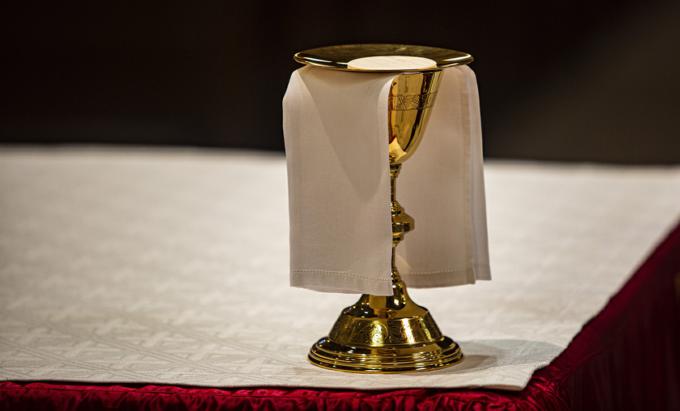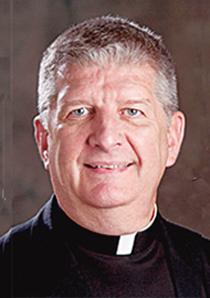
Faith
... if you need a quick review of God's action in Israel, Christ's Paschal Mystery, and the church's mission until the Lord's return, you can read this prayer.

O'Grady
All our Eucharistic Prayers are based on and inspired by Sacred Scripture. Eucharistic Prayer IV is a wonderful summary of the whole of salvation history from creation, through the life of Israel, to the life, ministry, death, resurrection of Christ, and looking forward to his Second Coming. If the prayer had footnotes, they would be overwhelmingly from both the Old and New Testaments.
Combine this with the pattern that the authors of this prayer had before them, the Eucharistic Prayer of St. Basil -- a prayer used by many of our sisters and brothers in the Eastern Churches, both Catholic and Orthodox.
The first idea was simply to bring Basil's ancient prayer directly into our Roman Missal. However, its internal arrangement and format is not the same as the other Eucharistic Prayers, and the papal advisers thought keeping this similarity was important. It seems also that Pope St. Paul VI agreed with them on this but still favored the idea of a prayer at least based on Basil's prayer.
One of the subcommittees commissioned for the work wanted to expand the scriptural references and so they asked for additional consultors, biblical experts, to be added to their team. Their work resulted in our Eucharistic Prayer IV.
A unique characteristic of the prayer is that it is one narrative summary -- from preface to the Great Amen -- of salvation history. Or maybe better put, if you need a quick review of God's action in Israel, Christ's Paschal Mystery, and the church's mission until the Lord's return, you can read this prayer.
This prayer is long. Unlike the other three, there are no variable parts. The whole prayer must be used with no changes. You will notice that there is no place to mention the name of a deceased, the only saints are the Blessed Virgin and her spouse, St. Joseph, no others may be added. The only place where there is a variable is, as in all others, the mention of the name of the pope and the diocesan bishop and auxiliary bishops if there are any.
Because of these limitations, this prayer is not heard often in parishes -- or likely elsewhere. My guess is that its length is the primary reason.
The next is the stated intention of the prayer's narration of salvation history requiring a greater familiarity with the whole of Sacred Scripture than might be expected in an average Sunday assembly.
Another, and this is most unfortunate, is the translation issue. In its original Latin, it is the least problematic when it comes to gender references. But when, following instructions from the Holy See, the translators had to account in English for every word in Latin and could not add words not in the Latin original, the "sexist" language appeared.
Those are some of the issues that explain why bishops and priests will not often choose this Eucharistic Prayer, and why we do not hear it prayed at Mass.
Even if it were better translated, the prayer would be limited to use in "ordinary time." That means, we could not use it in the Lent, Easter, Advent, or Christmas seasons, nor on saints' days. While ordinary time -- think green vestments -- covers a substantial section of the church's calendar, using this prayer at daily Mass, especially when folks are on their way to work, or on Sunday when the assembly is much more varied in age, ethnic, and language composition -- would be a challenge.
On the other hand, the similarity to the Eucharistic Prayers of our Eastern brothers and sisters would make this a wonderful sign of the unity that we already have with them and the desire to have the fullness of that unity realized in the joint celebration of the Eucharist.
As significant and important as that would be, for all of us, a wider use of this prayer would place that whole history of salvation before us. An important aspect of our common liturgical prayer is that it also teaches us by reminding us of and bringing us into the event of the Last Supper, but also all that led up to that saving event and all that is required of those who participate in it.
Every time we pray in a liturgy, some aspect of our faith is celebrated. For example, when we sing the Lamb of God before the reception of Holy Communion, we are saying that we believe that this Lamb -- Jesus Christ who died -- takes away our sins by his death. Prayer expresses faith.
Even if you do not hear this prayer proclaimed at Holy Mass very often, it is a prayer "worth praying."
As with all the Eucharistic Prayers, we can hear them at Mass most certainly, but praying them apart from Mass is a wonderful aid to our own prayer life and personal devotion.
Recent articles in the Faith & Family section
-
7 reasons to pray for the cardinals in conclaveJaymie Stuart Wolfe
-
Legacies in Ordinary TimeLucia A. Silecchia
-
What are my Easter duties?Jenna Marie Cooper
-
On the Camino: Jentillaks and jazzMark T. Valley
-
From the Eternal CityArchbishop Richard G. Henning























